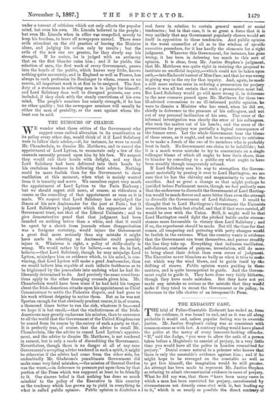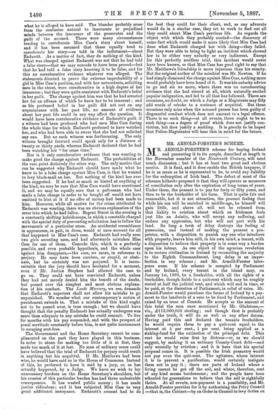THE ENDACOTT CASE.
THE trial of Police-Constable Endacott has ended as, from the evidence, it was bound to end, and as it was all along probable it would end, unless popular feeling was to override justice. Mr. Justice Stephen's ruling was as consistent with common-sense as with law. A contrary ruling would have placed the police at the mercy of every innocent-looking offender. "If," said the Judge, "you were to allow the oath of a person taken before a Magistrate to convict of perjury, in a very little time you would have all the police in London committed for perjury." Denial comes natural to a prisoner who knows that there is only the constable's evidence against him ; and if ho might hope to be revenged on the constable as well as to get free himself, the temptation would be still greater. An attempt has been made to represent Mr. Justice Stephen as refusing to admit circumstantial evidence in cases of perjury. What he did say was, that there "have been many cases in which a man has been convicted for perjury, corroborated by circumstances not directly connoted with it, but leading up to it," which is as nearly as possible the direct contrary-of
what he is alleged to have said. The blunder probably arose from the confusion natural to inaccurate or prejudiced minds between the innocence of the prosecutor and the guilt of the accused. There were many circumstances tending to corroborate Miss Cass's story about herself, and it has been assumed that these equally tend to corroborate her story—as told in the indictment—about Endacott. As a matter of fact, they do nothing of the kind.
What was charged against Endacott was not that he had told a false story—that we may concede to have been proved—but that he had told a false story knowing it to be false, and for this no corroborative evidence whatever was alleged. The statements directed to prove the extreme improbability of a girl in Miss Cass's position, and with her antecedents, soliciting men in the street, were corroborative in a high degree of her innocence ; but they were quite consistent with Endacott's belief in her guilt. The charge against him was that he had arrested her for an offence of which he knew her to be innocent ; and as his professed belief in her guilt did not rest on any acquaintance with her past life, no amount of evidence about her past life could in any way affect the question. It would have been corroborative evidence of Endacott's guilt if a witness had been produced who had seen Miss Cass during the whole time for which Endacott professed to have watched her, and who had been able to swear that she had not solicited any one. But no such witness was forthcoming. The only witness brought forward could speak only for a distance of twenty or thirty yards, whereas Endacott declared that he had been watching her "for some time." Nor is it only corroborative evidence that was wanting to make good the charge against Endacott. The probabilities of the case point decisively the other way. The only motive that can be suggested why Endacott should have made what he knew to be a false charge against Miss Cass, is that he wanted to levy black-mail on her. But nothing of the kind has ever been suggested. If he had so much as hinted at anything of the kind, we may be sure that Miss Cass would have mentioned it, and we may be equally sure that a policeman who had made a false charge in order to be bought off would not have omitted to hint at it if no offer of money had been made to him. Moreover, while all motive for the crime attributed to Endacott was wanting, there was an obvious explanation of the error into which he had fallen. Regent Street in the evening is a constantly shifting kaleidoscope, in which a constable charged with the special duty of preventing solicitation has to follow the movements of a particular atom. An accidental resemblance in appearance, in gait, in dress, would at once account for all that happened in Miss Case's case. Endacott had really seen two girls accosting men, and had afterwards mistaken Miss Cass for one of them. Concede this, which is a perfectly possible, and even probable hypothesis, and the whole case against him disappears,—the case, we mean, in reference to perjury. He may have been careless, or stupid, or obsti- nate, but he certainly was not perjured. It is incon- ceivable that the jury should have hesitated for a moment, even if Mr. Justice Stephen had allowed the case to go on. They could not have convicted Endacott, unless they had not merely denied him the benefit of the doubt, but passed over the simplest and most obvious explana- tion of his conduct. The Leeds Mercury, we see, demands that Endacott's superiors shall not allow his mistake to go unpunished. We wonder what our contemporary's notion of punishment extends to. That a mistake of this kind ought not to be passed over, is true enough ; but we should have thought that the penalty Endacott has actually undergone was more than adequate to any mistake he could commit. To live for months with his pay suspended, and with the prospect of penal servitude constantly before him, is not quite tantamount to escaping scot-free. The Government and the Home Secretary cannot be com- plimented on the part they have played in this business. In order to atone for making too little of it at first, they made too much of it at last. No man of ordinary sense could have believed that the trial of Endacott for perjury could result in anything but his acquittal. If Mr. Matthews had been wise, he would have said so in the House of Commons. Instead of this, he preferred to have it said by a jury, or, as has actually happened, by a Judge. We have no wish to lay unnecessary burdens on the Home Secretary's shoulders, but his evasion of this particular burden has had three undesirable consequences. It has wasted public money ; it has made justice ridiculous ; and it has subjected Miss Case to very great additional annoyance. Endacott's counsel had to do
the best they could for their client, and, as any advocate would do in a similar case, they set to work to find out all they could about Miss Case's previous life. As regards the object with which they probably started—the discovery of some fact which would make it more likely that Miss Cass had done what Endacott charged her with doing—they failed. But they were able to bring to light an incident which showed her to be either very unlucky or very indiscreet. Except for this perfectly needless trial, this incident would never have been known, so that Miss Cass has good right to say that Mr. Matthews's friendship is more injurious than his enmity. But the original author of the mischief was Mr. Newton. If he had simply dismissed the charge against Miss Cass, nothing more would probably have been heard of it. It was his unlucky advice to go and sin no more, where there was no corroborating evidence that she had sinned at all, which naturally excited popular indignation, and led to all that has followed. There are occasions, no doubt, on which a Judge or a Magistrate may fitly add words of rebuke to a sentence of acquittal. But these occasions only arise when the accused person has been guilty of disgraceful conduct which does not amount to a legal offence. There is no such thing—at all events, there ought to be no such thing—as a degree of proof which does not justify con- viction, but does justify a scolding. It is greatly to be hoped that Police-Magistrates will bear this in mind for the future.



















































 Previous page
Previous page